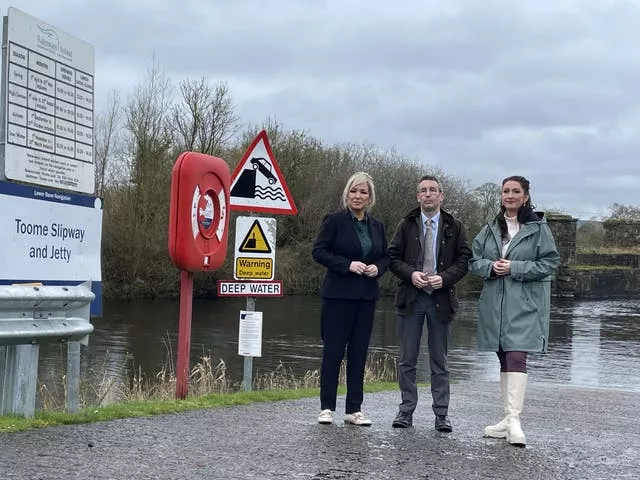Work to tackle pollution problems at Lough Neagh may have to be paused due to a budget shortfall, a Stormont minister has warned.
Agriculture and Environment Minister Andrew Muir said there was a need to “get real” about environment issues in the North as he expressed concerns over the potential allocation to his department in the Executive’s forthcoming budget.
Last week it emerged that resource bids made by Stormont ministers ahead of the budget amounted to more than three times the funding available to Sinn Féin Finance Minister Caoimhe Archibald to allocate.

Ms Archibald has received bids totalling £3.2 billion (€3.7 billion) for funding from her resource budget, but has only £1 billion to allocate once previously earmarked funding is taken into account.
Last month, Mr Muir said “difficult interventions” would be required to address the environmental crisis in Lough Neagh.
Last summer noxious blooms covered large parts of the lough and affected other waterways and beaches in the region.
There are fears the blue-green algae will return this summer.
Contributing factors are believed to include nitrogen and phosphorus from agricultural fertiliser running off fields, the spread of the invasive zebra mussel species and climate change, with the highest water temperature at Lough Neagh recorded last June.
On Monday, Mr Muir warned that work to address the issues could not proceed without a “fair” budget allocation.
“I’m very conscious that the budget situation that Northern Ireland faces in terms of potential decisions will involve very difficult choices to be made by all ministers,” he told Assembly question time.
“And I’ll not shy away from those decisions myself, I’m not someone who is known for that and I am someone who is very keen to ensure that as an executive, we are successful, and we are able to set a budget.
“But it’s important that our budget is a fair budget and is a budget that allows the departments to deliver upon their expectations and duties for the people of Northern Ireland.
“I welcome the fact that the Executive at their first meeting set the priority in terms of tackling the issues associated with Lough Neagh.”
Mr Muir said the public wanted to see action on the lough and related issues around water quality.
“My concern around the budget of what could be allocated to my department is that in terms of what my department would be able to do – I would be potentially doing less, rather than more,” he said.

“That would mean that in terms of any actions associated with Lough Neagh that they will be paused. And I don’t think that is credible nor acceptable. We need to be able to invest in terms of actions associated with Lough Neagh.
“And that is something I’m quite keen as a point to make to Executive colleagues, because if you’re going to make Lough Neagh a priority, we need to fund it.”
Mr Muir said a lack of funding would also undermine the work of his department to allocate agricultural support payments to farmers and also make compensation payments related to Bovine TB.
The minister’s Alliance party colleague, Paula Bradshaw, had used Assembly question time to ask him to set out how the budget could affect the planned work around Lough Neagh.
He outlined a series of proposed actions around engagement, education and enforcement.
“If we don’t fund any of that, then what do people expect is going to happen in relation to Lough Neagh? The situation is going repeat itself,” he said.
“So we need to fund these interventions. We also need to fund our wastewater infrastructure.
“We can’t on the one hand bemoan the consequences of pollution in Lough Neagh and then not fund the interventions that are required to deal with the source of it.
“So we need to get real in relation to the environment here in Northern Ireland.
“We have a problem here. We need to acknowledge it. We also need to fund it.
“And this is what is ultimately fundamental for my department. I recognise there’s difficult choices to be made across Northern Ireland in terms of budgets and departments.
“I fully get that. But if we’re going to make something a priority, then what we need to do is we need to be able to fund it.”







